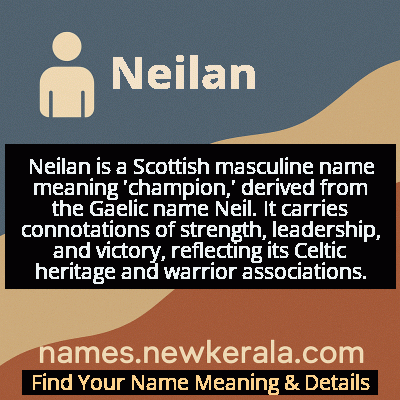Neilan Name Meaning & Details
Origin, Popularity, Numerology Analysis & Name Meaning of Neilan
Discover the origin, meaning, and cultural significance of the name NEILAN. Delve into its historical roots and explore the lasting impact it has had on communities and traditions.
Name
Neilan
Gender
Male
Origin
Scottish
Lucky Number
1
Meaning of the Name - Neilan
Neilan is a Scottish masculine name meaning 'champion,' derived from the Gaelic name Neil. It carries connotations of strength, leadership, and victory, reflecting its Celtic heritage and warrior associations.
Neilan - Complete Numerology Analysis
Your Numerology Number
Based on Pythagorean Numerology System
Ruling Planet
Sun
Positive Nature
Leaders, ambitious, highly driven, self-reliant, innovative.
Negative Traits
Overly aggressive, domineering, impatient, selfish.
Lucky Colours
Red, orange, gold.
Lucky Days
Sunday.
Lucky Stones
Ruby, garnet.
Harmony Numbers
2, 3, 9.
Best Suited Professions
Entrepreneurs, managers, engineers.
What People Like About You
Courage, determination, leadership.
Famous People Named Neilan
Neilan D. Kemp
Military Officer
Distinguished U.S. Army officer who served in World War II and received multiple commendations
Neilan Tyree
Musician/Producer
Contemporary R&B artist and producer known for innovative sound production techniques
Neilan McPartland
Sports Coach
Renowned Gaelic football coach in Ireland, leading teams to multiple championship victories
Name Variations & International Equivalents
Click on blue names to explore their detailed meanings. Gray names with will be available soon.
Cultural & Historical Significance
The name's evolution from Niall to Neilan demonstrates the linguistic adaptations that occurred as Gaelic names were Anglicized while maintaining their cultural essence. In Scottish tradition, names like Neilan were often bestowed upon children expected to demonstrate leadership qualities or to honor ancestral connections to prominent clan figures, making it more than just an identifier but a statement of heritage and expectation. Throughout Scottish history, the name has been associated with individuals who played significant roles in clan leadership, military service, and cultural preservation, reinforcing its connection to strength and tradition in the Scottish consciousness.
Extended Personality Analysis
Individuals named Neilan are typically perceived as natural leaders with strong, charismatic personalities. They often exhibit confidence, determination, and a competitive spirit that aligns with the name's meaning of 'champion.' These individuals tend to be ambitious and goal-oriented, approaching challenges with strategic thinking and resilience. Their leadership qualities are often complemented by a protective nature toward those they care about, showing loyalty and commitment in personal relationships.
While they can be assertive and decisive when necessary, Neilans often balance this strength with emotional intelligence and the ability to inspire others. They typically value tradition and family connections while embracing progressive ideas, creating a unique blend of respect for heritage and forward-thinking innovation. This combination makes them effective in roles requiring both authority and empathy, whether in professional settings or personal circles. The name's Scottish origins also suggest a connection to practicality, resilience, and a strong work ethic—qualities historically valued in Scottish culture and often reflected in those who bear this distinguished name.
Modern Usage & Popularity
In contemporary times, Neilan maintains a steady but uncommon presence, particularly in Scottish communities and among families with Celtic heritage. The name has experienced a modest resurgence as part of the broader trend toward reviving traditional and culturally significant names. While not ranking among the most popular names in Scotland or other English-speaking countries, it holds appeal for parents seeking a distinctive yet historically grounded name that honors Scottish ancestry. Its usage has expanded beyond Scotland to other countries with Scottish diaspora communities, including Canada, the United States, Australia, and New Zealand. The name's relative rarity in modern times adds to its distinctive quality, making it an attractive choice for parents wanting a traditional name that stands out without being overly unconventional. Recent naming trends show increased interest in Celtic names, which may contribute to gradual growth in Neilan's usage among families valuing cultural heritage and unique naming options.
Symbolic & Spiritual Meanings
Symbolically, Neilan represents strength, leadership, and the enduring power of heritage. The champion connotation evokes images of victory, protection, and noble purpose, while the alternative meaning of 'cloud' connects to Celtic spiritual traditions where clouds represented divine messages and transitions between worlds. This dual symbolism creates a rich metaphorical landscape where Neilan embodies both earthly strength and spiritual awareness. The name also symbolizes ancestral continuity and the preservation of cultural identity through generations. In a broader sense, it represents the bridge between ancient traditions and modern identity, carrying forward the values of courage, loyalty, and community that defined Scottish clan culture. The symbolic weight of the name suggests someone destined to overcome challenges and protect what they value, while maintaining connection to their roots and cultural legacy, making it a powerful choice that conveys both personal strength and cultural pride.

